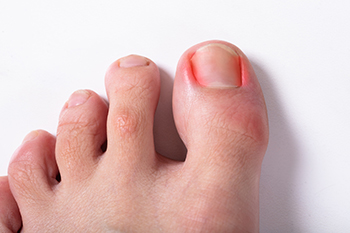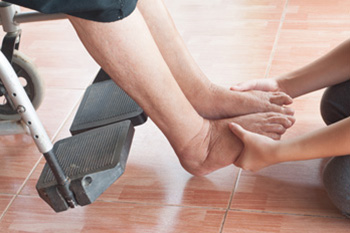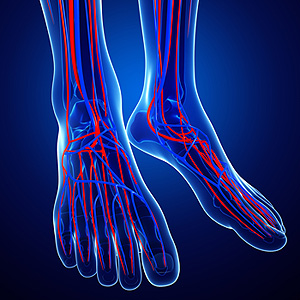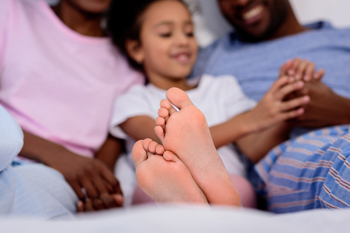July 2022
Causes and Treatment for Ingrown Toenails

One of the most painful, not to mention annoying, skin irritations is an ingrown toenail. It is simply the result of the nail, commonly on the big toe, growing into the skin that surrounds it. Ingrown toenails can be the result of cutting the nails too short, or, ironically, by letting them grow too long. Nails that are ripped or torn, or nails that are cut into a rounded shape, also can cause ingrown toenails. They cause pain and sometimes redness, especially if the toes are encased in shoes that are too tight in the toe box. Improperly fitting shoes, along with toe injuries, and repetitive activity are among other causes of ingrown toenails. Cutting toenails straight across and soaking the feet in a salt-water bath a few times a day can help to relieve the pain. However if the ingrown toenail pain increases, becomes warm to the touch, or if there is a buildup of pus and an unpleasant odor, it may be infected. This would be a good time to consult with a podiatrist for immediate treatment.
Ingrown toenails can become painful if they are not treated properly. For more information about ingrown toenails, contact Dr. Steven Schwartz of Pennsylvania. Our doctor can provide the care you need to keep you pain-free and on your feet.
Ingrown Toenails
Ingrown toenails occur when a toenail grows sideways into the bed of the nail, causing pain, swelling, and possibly infection.
Causes
- Bacterial infections
- Improper nail cutting such as cutting it too short or not straight across
- Trauma to the toe, such as stubbing, which causes the nail to grow back irregularly
- Ill-fitting shoes that bunch the toes too close together
- Genetic predisposition
Prevention
Because ingrown toenails are not something found outside of shoe-wearing cultures, going barefoot as often as possible will decrease the likeliness of developing ingrown toenails. Wearing proper fitting shoes and using proper cutting techniques will also help decrease your risk of developing ingrown toenails.
Treatment
Ingrown toenails are a very treatable foot condition. In minor cases, soaking the affected area in salt or antibacterial soaps will not only help with the ingrown nail itself, but also help prevent any infections from occurring. In more severe cases, surgery is an option. In either case, speaking to your podiatrist about this condition will help you get a better understanding of specific treatment options that are right for you.
If you have any questions please feel free to contact our offices located in Chambersburg, and Mcconnellsburg, PA . We offer the newest diagnostic and treatment technologies for all your foot and ankle needs.
Tips for Proactive Foot Care in Seniors

As an individual ages, it becomes even more essential that they are able to maintain proper foot health. This is because if a senior citizen has significantly unhealthy feet, their freedom and independence will be substantially reduced. However, as an individual ages, they also become more susceptible to experiencing foot afflictions. Therefore, senior citizens who want to take extra care of their health should be proactive in maintaining good foot care. One way to do this is to have a set time daily or once each week to examine the feet. The senior can do this by themselves or by asking for the help of a friend. Simply examine the foot for any noticeable problems including redness, swelling, deformations, or complications in the toenails. Scheduling a kind of regular inspection can be helpful for seniors because it enables them to check for any potential problems before they become exacerbated with time. Additionally, to be proactive, seniors can be sure that the shoes that they are wearing are not restrictive or too tight. Wearing properly fitted footwear is essential when an individual ages because ill-fitting shoes can reduce blood circulation and facilitate other troublesome foot afflictions. If you are a senior, be especially diligent when shoe shopping and ask for assistance in finding the best fitting shoes for you. These are just some of many potential proactive foot care tips for seniors. For more, contact a podiatrist.
Proper foot care is something many older adults forget to consider. If you have any concerns about your feet and ankles, contact Dr. Steven Schwartz from Pennsylvania. Our doctor can provide the care you need to keep you pain-free and on your feet.
The Elderly and Their Feet
As we age we start to notice many changes in our body, but the elder population may not notice them right away. Medical conditions may prevent the elderly to take notice of their foot health right away. Poor vision is a lead contributor to not taking action for the elderly.
Common Conditions
- Neuropathy – can reduce feeling in the feet and can hide many life-threatening medical conditions.
- Reduced flexibility – prevents the ability of proper toenail trimming, and foot cleaning. If left untreated, it may lead to further medical issues.
- Foot sores – amongst the older population can be serious before they are discovered. Some of the problematic conditions they may face are:
- Gouging toenails affecting nearby toe
- Shoes that don’t fit properly
- Pressure sores
- Loss of circulation in legs & feet
- Edema & swelling of feet and ankles
Susceptible Infections
Diabetes and poor circulation can cause general loss of sensitivity over the years, turning a simple cut into a serious issue.
If you have any questions please feel free to contact our offices located in Chambersburg, and Mcconnellsburg, PA . We offer the newest diagnostic and treatment technologies for all your foot and ankle needs.
Treating Poor Circulation in the Feet

When blood circulation to the feet becomes impaired, an individual may suffer a variety of negative consequences. For example, when circulation slows, the feet can become numb, discolored, and cold. In some cases, poor circulation might even cause hair loss below the knees and cracked skin on the feet. Pregnant women and individuals suffering from diabetes are at a particular risk of suffering from poor circulation. However, there are several steps that you can take to improve and promote blood circulation to your feet. First, you might consider purchasing a pair of compression socks, which exert pressure on your feet, effectively encouraging circulation by forcing blood vessels to travel up to the heart. To promote better circulation, you might also try simply adding more physical activity to your daily routine if you are someone who spends a significant part of your day at rest. By increasing movement, you can effectively loosen arteries and facilitate blood circulation. Lastly, you might try massaging your feet to jump start blood circulation throughout the feet. Contacting a podiatrist may help you better understand ways that you can increase blood circulation in your feet.
Poor circulation is a serious condition and needs immediate medical attention. If you have any concerns with poor circulation in your feet contact Dr. Steven Schwartz of Pennsylvania. Our doctor will treat your foot and ankle needs.
Poor Circulation in the Feet
Poor blood circulation in the feet and legs is can be caused by peripheral artery disease (PAD), which is the result of a buildup of plaque in the arteries.
Plaque buildup or atherosclerosis results from excess calcium and cholesterol in the bloodstream. This can restrict the amount of blood which can flow through the arteries. Poor blood circulation in the feet and legs are sometimes caused by inflammation in the blood vessels, known as vasculitis.
Causes
Lack of oxygen and oxygen from poor blood circulation restricts muscle growth and development. It can also cause:
- Muscle pain, stiffness, or weakness
- Numbness or cramping in the legs
- Skin discoloration
- Slower nail & hair growth
- Erectile dysfunction
Those who have diabetes or smoke are at greatest risk for poor circulation, as are those who are over 50. If you have poor circulation in the feet and legs it may be caused by PAD and is important to make changes to your lifestyle in order to reduce risk of getting a heart attack or stroke. Exercise and maintaining a healthy lifestyle will dramatically improve conditions.
As always, see a podiatrist as he or she will assist in finding a regimen that suits you. A podiatrist can also prescribe you any needed medication.
If you have any questions please feel free to contact our offices located in Chambersburg, and Mcconnellsburg, PA . We offer the newest diagnostic and treatment technologies for all your foot and ankle needs.
Children’s Foot Pain

When a child complains about pain in their leg, it might be coming from a problem with their foot. Flat feet, or feet without a well-developed arch, is common among children. While some kids might not experience any symptoms of flat feet, others might feel cramping or tenderness in their feet, lower leg, or knee. They might limp or show an aversion to athletic activities and walking because of pain in their feet. While foot pain in children might be from growing, it could be something else that deserves examination by a qualified podiatrist. They might have a structural abnormality of the foot that requires orthotics or surgery. If your child complains of foot or leg pain, it is suggested you consult with a podiatrist who can properly diagnose their condition and offer treatment options.
The health of a child’s feet is vital to their overall well-being. If you have any questions regarding foot health, contact Dr. Steven Schwartz of Pennsylvania. Our doctor can provide the care you need to keep you pain-free and on your feet.
Tips for Keeping Children's Feet Healthy
- Make sure their shoes fit properly
- Look for any signs of in-toeing or out-toeing
- Check to see if they have Clubfoot (condition that affects your child’s foot and ankle, twisting the heel and toes inward) which is one of the most common nonmajor birth defects.
- Lightly cover your baby’s feet (Tight covers may keep your baby from moving their feet freely, and could prevent normal development)
- Allow your toddler to go shoeless (Shoes can be restricting for a young child’s foot)
- Cut toenails straight across to avoid ingrown toenails
- Keep your child’s foot clean and dry
- Cover cuts and scrapes. Wash any scratches with soap and water and cover them with a bandage until they’ve healed.
If you have any questions, please feel free to contact our offices located in Chambersburg, and Mcconnellsburg, PA . We offer the newest diagnostic and treatment technologies for all your foot care needs.


